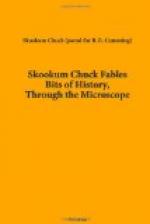In the midst of all this ruin and decay, however, there was sunshine, and the heart of Hard Times Hance was warm and buoyant, cheerful and hopeful, and even if he did live upon the husks which the swine did eat, he derived from his life a great deal more pleasure than the world gave him credit for. He had his future to live for. He had his life all mapped out, and that was more than a great many could boast of. For breakfast he had mush, for dinner he had beans and bacon, and for supper he had bacon and beans and Y.S. tea. And he was just as happy eating this fare with his knife as the Lieutenant-Governor of the Province of British Columbia could be with his cereal, consomme, lobster salad, charlotte russe, blanc mange, cafe noir, or any other dainty and delicate importation. Bananas, oranges and artichokes had no place on his bill-of-fare. Besides, after he had eaten a meal he had no space for such delicacies. And he could always wash his meal down with the famous Y.S. tea stand-by; and, on top of this, a few long draws at his kin-i-kin-nick (sort of Indian tobacco) pipe. And then there were no restrictions upon his mode of feeding his face. He could eat with his knife with impunity. There was no etiquette-mad society digging him in the ribs, and jerking on the reins in protestation at every one of his natural inclinations; and he could use his own knife to butter his sourdough bread. For a man who expected to emerge into the sunshine of society, he was giving himself very inadequate training. He was as near the aboriginal as it was possible for a white man to approach. He was a Siwash (male Indian) with one exception—his love of the coin. But then, he had an object in this ambition; and a fault, if it is a means to a worthy end, must be commended. He had this propensity developed to the most pronounced degree. It was a disease with him, for which there was no cure. In outward appearance he was a typical B.C. specimen of the obsolete “coureur de bois” of eastern Canada during the seventeenth century.




